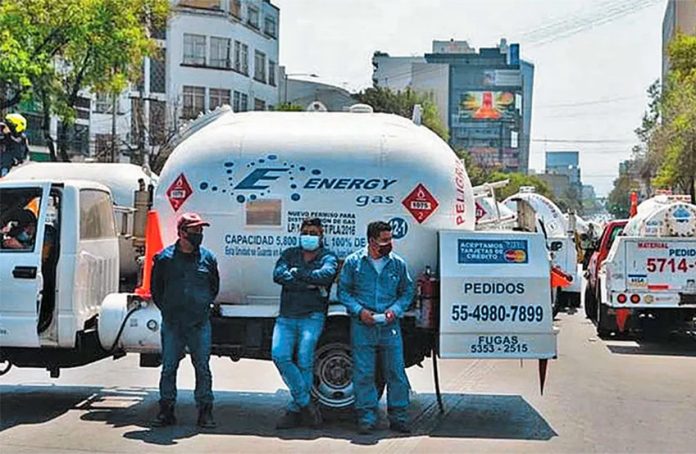Many LP gas distributors went on strike in Mexico City and México state on Tuesday to protest against price ceilings set by the Energy Regulatory Commission (CRE) on Sunday.
The National Gas Workers Union called on crews that distribute gas to go on an indefinite strike to protest the price controls, which caused prices to drop by almost 11% on average across Mexico and 24% in Mexico City. Gas workers said the strike could expand to other states.
The CRE published maximum LP gas prices for 145 regions across the country after the Energy Ministry instructed it to do so last week, a directive deemed illegal by Mexico’s antitrust regulator. The current price caps on LP gas – used by almost four in five Mexican households for cooking and to fuel water heaters – will remain in effect until Saturday but controls will continue for six months.
President López Obrador, who is aiming to keep all fuel price increases below the level of inflation, has railed against recent gas price hikes, asserting they have occurred “unjustifiably.”
Last month he announced the creation of a new state-owned company that will distribute LP gas, much of which is imported, at “fair prices.”
Many gas distributors say that the price caps announced by the CRE will hurt their earnings and make their jobs unviable. On Tuesday, trucks owned by small independent distribution companies and their crews blocked entrances to gas tank farms in greater Mexico City to protest the price ceilings.
Experts had warned that imposing price caps would likely lead to gas shortages because distributors could refuse to operate if the government sought to limit their profits. Ricardo Sheffield, chief of the consumer protection agency Profeco, warned that gas distributors could be stripped of their licenses if they didn’t respect the new price ceilings.
The Mexican Association of Gas Distributors, another organization that represents gas tank farms and large distribution companies that own fleets of trucks, didn’t support Tuesday’s strike.
It distanced itself from “the actions by groups of independents who work on commission, who do not hold distribution permits and who are blocking plants, preventing us from going out and working to supply homes and businesses that need gas.”
Photos published by media outlets showed masked men smashing the windows of some small gas tank trucks in an apparent attempt to force their crews to join the strike, which left many gas consumers in the Valley of México, including business owners, without gas.
Some residents of Tlalnepantla, a México state municipality that borders the capital, went to the neighborhood of San Juan Ixhuatepec, where several gas vendors are located, to try to purchase the fuel. But many were unsuccessful because the companies were closed or out of gas.
Ascención Ávila, a housewife, was unable to buy gas at four different companies she visited.
“Obviously it’s something basic we need to do our [household] activities,” she told the newspaper Reforma. “… I’m surprised that none of the gas companies have any. … I see that I’m not the only one [without gas], there are a lot of people in this situation.”
Some small-scale gas distributors who didn’t heed the advice to strike also found themselves unable to purchase gas.
“The instruction was to strike but a lot of us live day to day. … Today we won’t earn anything,” one distributor said.
In Nicolás Romero, another México state municipality that is part of the greater Mexico City metropolitan area, an employee of a small gas distribution company told Reforma that López Obrador had not shown a willingness to talk to gas companies about their prices.
“Ultimately, [gas] companies have to make some profit. If they don’t, how will they pay employees, gasoline and everything else they have to use in order to provide service,” he said.
UPDATE: The union called off the work stoppage on Wednesday afternoon, telling reporters at a press conference that participating distributors had resumed gas deliveries.
